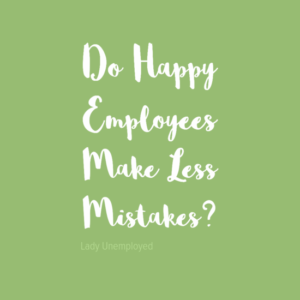
It’s officially time for me to seek out new pastures at my present job. Between coworker issues and just a general feeling that I’ve hit the wall of growth at this place, I’m just not that happy at my job anymore.
And lately I’ve noticed I’ve started making more careless mistakes. Not reading emails completely. Getting behind on small assignments. And a few other small mistakes which made me wonder today if being happy at your job equates making less mistakes?
I came across a bit of research that answers my question. According to the Journal of Applied Business Research (Vol. No1, March 2014), “Engaged employees make fewer mistakes than disengaged employees because they want to ensure a job well done. They pay more attention to details and work with a greater sense of accuracy.” (SOURCE)
Isn’t that interesting? When we’re engaged at our job, we’re less likely to make mistakes. We’re more accurate. We pay better attention. We WANT to do well. I ask myself – do I want to do well at this job? In all honesty, I’m not sure. Mostly, if I was being honest with myself, I often feel too stressed out and want to get through the day and go home. Considering I’m spending eight hours of my day feeling like this, I think that may be why I’m making more mistakes.
Perusing on Google brought me to one site that recommended ways to make employees happy. One key tip jumped out at me.
“Listen to your employees.” (read the full article here)
The thing is while I am asked for feedback at work, there is a difference between someone being listened to and someone being heard. My employer sends out yearly surveys and I answer honestly. I sit with my supervisor every few months to talk about my quarterly goals. But I feel like when you are HEARD, your words are taking action. They have an impact. They get legs and start running a marathon.
I think what I want is active listening to happen with this employer. I don’t want to just suggest that working from home be more of an option. I want them to acknowledge my request. I want have a discussion in a meeting about why it isn’t happening or possibly how it CAN happen.
Recently, I mentioned to a supervisor that when people are afraid of making mistakes, they make more of them. She acknowledged that I was right. She admitted that management worries a lot about losing money which is why the reaction is so bad.
How can a company reduce that fear?
I remember once in a previous employer, the person training me during my first few days said, “There is no mistake you can’t make here that can’t be fixed.”
I can’t tell you the burden that lifted off my shoulders when I heard that. I can also tell you that the place I’m working in now does not keep this truth close to heart. The last thing they would tell anyone is that mistakes are okay or even understood when you’re new.
So back to my question – do unhappy employees make more mistakes? I think the answer is yes. And I think the theory here is if you can’t make your job a happy place, it may be time to move on. What are your thoughts?

I can’t like this enough. I used to be in this situation and let me tell you, it doesn’t get better!
On the flip side, however, managers only have so much control and power over what they can do. Their hands are often forced by upper management. Just some food for thought.
This is very true! I think as much as the lower level management wants to change, I think upper level management are resistant to it.
I hated my job so much I recently quit before I landed another job. I wish I could blame it on my impulsiveness… But my quitting was 2 years in the making and I just snapped one day and turned in my resignation letter. Now I’m sitting at home, typing a comment here…I’m beginning to regret about it…
I’m so glad things aren’t working out for you. Feel free to submit a post to my site! I’d love to tell your story. I really hope you are able to achieve your dream!
[…] Quality – Work quality deteriorates when employee morale is low. In fact, according to the Journal of Applied Business Research, “engaged employees make fewer mistakes than disengaged employees because they want to ensure a […]